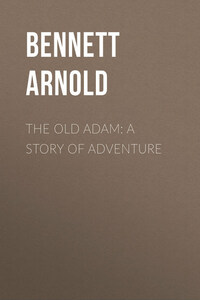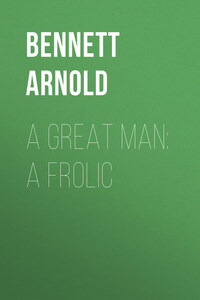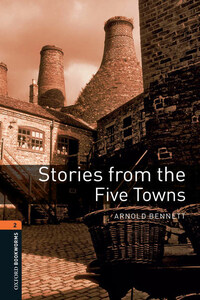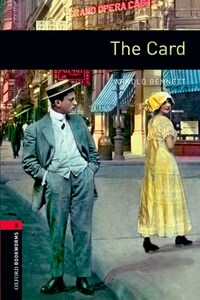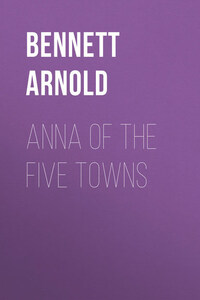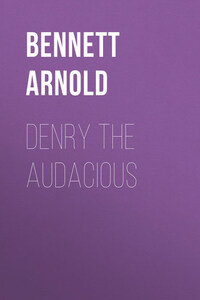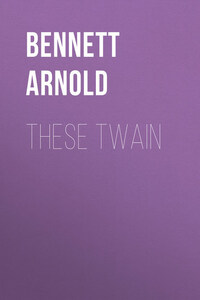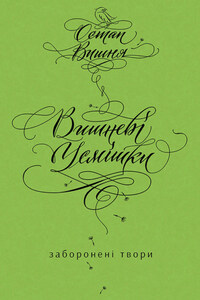I
"And yet," Edward Henry Machin reflected as at six minutes to six he approached his own dwelling at the top of Bleakridge, "and yet-I don't feel so jolly after all!"
The first two words of this disturbing meditation had reference to the fact that, by telephoning twice to his stockbrokers at Manchester, he had just made the sum of three hundred and forty-one pounds in a purely speculative transaction concerning Rubber shares. (It was in the autumn of the great gambling year, 1910). He had simply opened his lucky and wise mouth at the proper moment, and the money, like ripe golden fruit, had fallen into it, a gift from benign Heaven, surely a cause for happiness! And yet-he did not feel so jolly! He was surprised, he was even a little hurt, to discover by introspection that monetary gain was not necessarily accompanied by felicity. Nevertheless, this very successful man of the world of the Five Towns, having been born on the 27th of May, 1867, had reached the age of forty-three and a half years.
"I must be getting older," he reflected.
He was right. He was still young, as every man of forty-three will agree, but he was getting older. A few years ago a windfall of Three hundred and forty-one pounds would not have been followed by morbid self-analysis; it would have been followed by unreasoning instinctive elation, which elation would have endured at least twelve hours.
As he disappeared within the reddish garden wall which sheltered his abode from the publicity of Trafalgar Road, he half hoped to see Nellie waiting for him on the famous marble step of the porch, for the woman had long, long since invented a way of scouting for his advent from the small window in the bathroom. But there was nobody on the marble step. His melancholy increased. At the midday meal he had complained of neuralgia, and hence this was an evening upon which he might fairly have expected to see sympathy charmingly attired on the porch. It is true that the neuralgia had completely gone. "Still," he said to himself with justifiable sardonic gloom, "how does she know my neuralgia's gone? She doesn't know."
Having opened the front door with the thinnest, neatest latchkey in the Five Towns, he entered his home and stumbled slightly over a brush that was lying against the sunk door-mat. He gazed at that brush with resentment. It was a dilapidated handbrush. The offensive object would have been out of place, at nightfall, in the lobby of any house. But in the lobby of his house-the house which he had planned a dozen years earlier to the special end of minimising domestic labour, and which he had always kept up to date with the latest devices-in his lobby the spectacle of a vile outworn hand-brush at tea-time amounted to a scandal. Less than a fortnight previously he had purchased and presented to his wife a marvellous electric vacuum-cleaner, surpassing all former vacuum-cleaners. You simply attached this machine by a cord to the wall, like a dog, and waved it in mysterious passes over the floor, like a fan, and the house was clean! He was as proud of this machine as though he had invented it, instead of having merely bought it; every day he enquired about its feats, expecting enthusiastic replies as a sort of reward for his own keenness; and be it said that he had had enthusiastic replies.
And now this obscene hand-brush!
As he carefully removed his hat and his beautiful new Melton overcoat (which had the colour and the soft smoothness of a damson), he animadverted upon the astounding negligence of women. There were Nellie, his wife; his mother, the nurse, the cook, the maid-five of them; and in his mind they had all plotted together-a conspiracy of carelessness-to leave the inexcusable tool in his lobby for him to stumble over. What was the use of accidentally procuring three hundred and forty-one pounds?
Still no sign of Nellie, though he purposely made a noisy rattle with his ebon walking-stick. Then the maid burst out of the kitchen with a tray and the principal utensils for high tea thereon. She had a guilty air. The household was evidently late. Two steps at a time he rushed up-stairs to the bathroom, so as to be waiting in the dining-room at six precisely, in order, if possible, to shame the household and fill it with remorse and unpleasantness. Yet, ordinarily, he was not a very prompt man, nor did he delight in giving pain. On the contrary, he was apt to be casual, blithe, and agreeable.
The bathroom was his peculiar domain, which he was always modernising, and where his talent for the ingenious organisation of comfort and his utter indifference to esthetic beauty had the fullest scope. By universal consent admitted to be the finest bathroom in the Five Towns, it typified the whole house. He was disappointed on this occasion to see no untidy trace in it of the children's ablution; some transgression of the supreme domestic law that the bathroom must always be free and immaculate when Father wanted it would have suited his gathering humour. As he washed his hands and cleansed his well-trimmed nails with a nail-brush that had cost five shillings and sixpence, he glanced at himself in the mirror which he was splashing. A stoutish, broad-shouldered, fair, chubby man with a short bright beard and plenteous bright hair! His necktie pleased him; the elegance of his turned-back wristbands pleased him; and he liked the rich down on his forearms.
